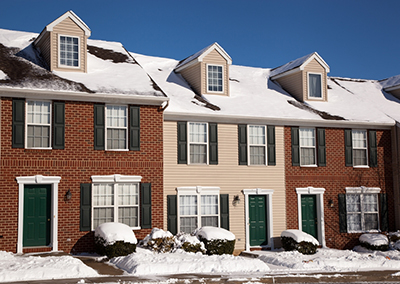
Many people along all parts of the home-owner spectrum choose to live in a condominium (“condo”) community, rather than in a single-family home. Condos may be “apartments” in multi-unit buildings, townhouses, or detached homes. What categorizes any of these as condos is how the community is managed.

This means that you can sell your condo, will it to your heirs, or rent it to tenants (within the guidelines provided by the By-laws). It’s a real-property investment that may appreciate in value. The mortgage interest on a condo purchase is tax deductible, to the extent provided by the IRS.
2. Someone else looks after keeping up the building and grounds. In today’s insanely pressured world, where two incomes are usually needed to pay for the basics, that’s important to young couples, who don’t spend enough time at home to look after a house. It’s also important to seniors who’ve done as much home-upkeep work as they care to, and to first-time home buyers who aren’t yet ready to take on the full responsibility of a detached home. 3. Security. Many – not all – condominium developments provide security – either through a guarded gatehouse, or through a security office in a high-rise building. This is important to many people, in an increasingly insecure world. 4. Recreational facilities. Condo developments often provide shared recreational facilities, such as a “club house,” swimming pool, tennis courts, playground, and picnic area. This is a terrific environment for parents of young children, because the facilities are nearby and relatively private, and for active teens and adults. Special party rooms are usually available for rent, for special occasions. 5. Assigned parking and storage. At least one parking space – and frequently one storage locker – is assigned to each unit in the condominium. 6. Everyone follows the same “rules.” The “rules” of the condominium are spelled out in the condo’s By-laws, to which everyone must adhere. Rather than being constraining, the By-laws ensure that everyone maintains the look and atmosphere of the development. They also spell out how shared facilities are to be used.
1.Monthly maintenance fee.
The building and grounds upkeep, the security, and the recreational facilities have to be paid for. So, a monthly maintenance fee is collected from all condo owners, usually proportioned according to the size of the condo.
2. Homeowners Association (HOA). The group that makes key decisions about the condominium development is usually elected from among the condo owners, but will include a representative from the property management company that manages the day-to-day operation of the condo. Some people do not like the HOA structure, whereas others see it as an opportunity to have a voice in how the community is run.
3. Limited “breathing room.” Many condos are attached; that is, one unit abuts another – either in a high-rise configuration or as townhouses. That can feel confining to those who prefer a detached home with land around it.

The Current Condo Market
Condominiums are becoming more popular, so many communities that did not used to have any condos have more recently authorized their development. If you are considering condo ownership, you now have lots of choice.
Middlesex County.
As of July 23, 2020, most communities have condos on the market. There are 464 active condo listings. Prices range from $84,262 for a 1-bedroom low-income condo in Monroe, to $799,900 for a 3-bedroom luxury townhome with a river view in Highland Park.
Somerset County.
Most communities have condos on the market as of July 23, 2020. There are 260 active listings. Prices range from $119,900 for a 1-bedroom condo in North Plainfield to $1,985,000 for a luxurious 3-bedroom townhome in Bernardsville.
Union County.
Many communities have condos on the market as of July 23, 2020. There are 145 active listings. Prices range from $89,999 for a 1-bedroom condo in Roselle, to $1,699,900 for a 2-bedroom luxury condo in Westfield.